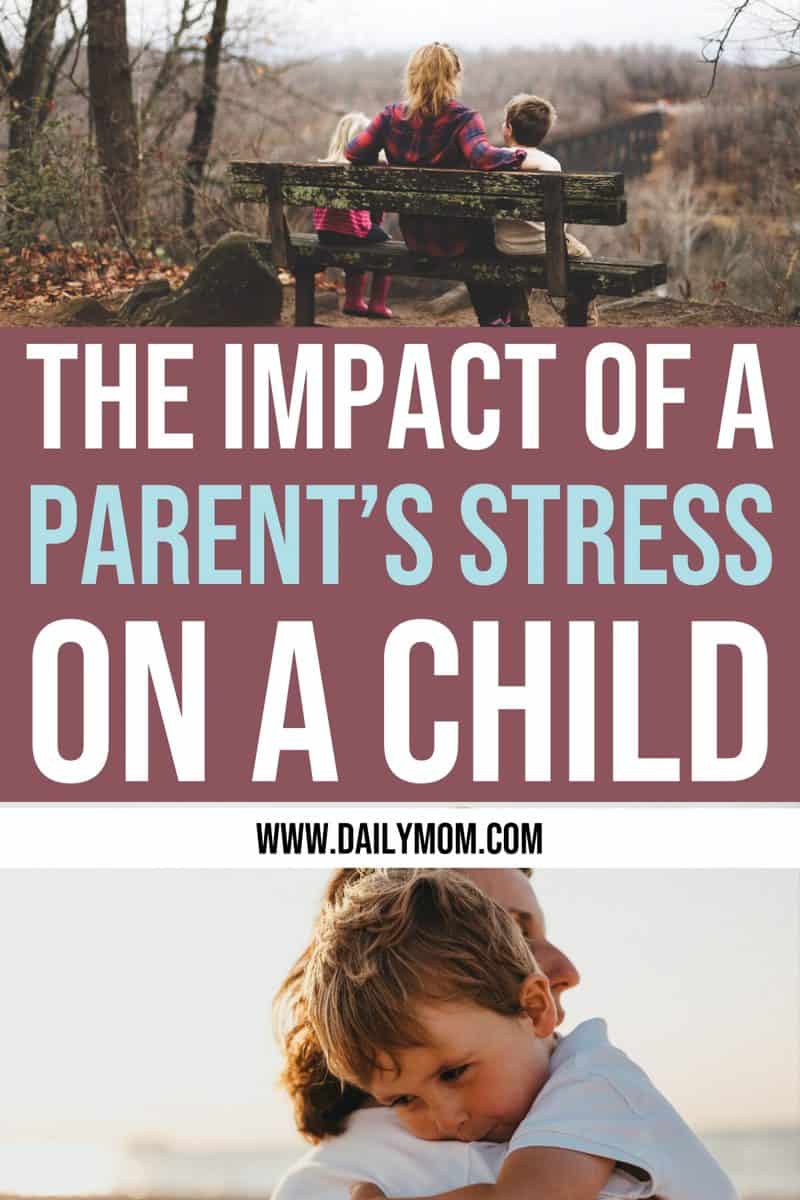Stress is a natural part of everyone’s daily lives. It can be due to lack of sleep, hectic schedules, getting kids to school, work and even something as simple as dinner not being ready. Stress is just a part of life. Everyone deals with some sort of stress, but not all stress is equal. Many headlines fail to mention that not all types of stress impact those around them, like parents and children. So the question is, does the stressed parents impact their children?
What is Stress?

Let’s first discuss what exactly stress is and the difference between ‘toxic’ and ‘normal’ stress. Stress is the body’s physical response to circumstances that are challenging or negative. According to the National Scientific Council on the Developing Child, there are 3 main types of stress:
- Positive Stress – This stress is short lived and only causes minor psychological changes such as heart rate changes or hormone level changes. This stress is a common part of life.
- Tolerable Stress – This is a more intense type of stress, but still short lived. Examples of this type of stress are accident, death of a loved one, or disruptions in life such as a divorce.
- Toxic Stress – Just as it sounds, toxic. This stress can be extremely harmful to children. It comes from experiences that have been sustained over weeks, months or even years. Examples of this type of stress are abuse, neglect, and severe household mental illness.
Stress in Parenthood

Parents often times tend to feel guilty about being stressed. Most times it is normal stress, but they feel this type of stress affects their children negatively and may be harmful. This isn’t always the case. Toxic stress is what is harmful. Normal stress usually comes from 4 common stressors which are work, family, money and health. Then again, whether normal or toxic, children can feel when stressed parents are having a rough time. For example, if a parent is sad, the child sees this and tends to get the feeling of sadness as well. Children sense a lot when it comes to their parents.
Stressed parents also feel that if they remain calm in front of their child, the child won’t feel the stress. However, children can still pick up on tension. Due to that, sometimes the child themselves can experience stress, anxiety, and other emotions. According to the ‘Stress and Children Publication’ from Princeton University, they describe how “stressful experiences that are mild or moderate, predictable, and of short lived duration are likely to enhance biological functioning and promote mastery and competence.” So stressed parents’ impact on a child in a way is a bit conflicting and most likely is different for each child.
The Impact of Stressed Parents on a Child

When can a parent’s stress start impacting a child? A parent’s stress can be felt by a child earlier than when they can even communicate. It starts when in utero. If a mother is stressed and/or anxious during her pregnancy, these stress hormones are going past the placenta hard and fast. Pregnancy stress has been linked to developmental problems in children such as child anxiety and ADHD. This is because when a mother is overly stressed, the hormone ‘cortisol’ can reach the unborn babies brain which is still developing and puts the baby at a heightened risk for disorders. Harvard Researchers in 2004 reported that prenatal exposure increased infants risk of autism, schizophrenia and depression. Also, a 2006 research study showed that these infants were likely to cry and fuss more than normal in the first 6 months. Another risk linked to stress in pregnant mothers is that of childhood obesity by the age of 12.
Everyday Stress

So can a parent’s everyday stress affect their child? Of course, parents stress does play a role in their child’s life. A study in 2013 published in the journal ‘Child Development’ showed there was a lasting effect on the child’s DNA from their parent’s stress. The result suggested that parents who are stressed during their child’s early years can leave a genetic imprint. This stress usually lasts through their adolescent years and can affect genetic expression later in life. It was also shown that a father’s stress level was more likely to impact a daughters DNA while a mother’s stress impacted both the daughters and sons DNA.
In 2004, researchers from Harvard published a study that showed children of stressed parents were more likely to develop asthma or allergies. However, on the other side, there are also reports such as this one from NPR stating “…some scientists now argue that our usual narrative of stress – that stress is universally bad for health – is too one-sided and doesn’t reflect the reality that some degree of stress can actually benefit people. Stress isn’t always a bad thing.” So that is why the impact of parental stress on children is a bit conflicting and different for each household.
In any case, parents should still do their best to ensure that their child isn’t negatively impacted by their daily stress. Some ideas for parents to reduce stress includes practicing relaxation strategies, increasing their support network, and working together as a family. A great way for the family to work together is to write down daily obligations on a wall calendar or list. And if there are things that cannot get done that day, decide as a family which activity can be removed for the time being. This way as a whole, when everyone is home together, stress levels can be reduced for everyone.
Parenting through our daily lives is not an easy task. It also does not need to be something someone feels they are failing at or dread. Parents are not superheroes. It is definitely not easy, but it helps for stressed parents to reach out to others once in a while for help when needed and to reduce their own life stressors. Also, parents need to break down the stigma that they have everything figured out, because the reality is, most times they don’t. In turn, as a result, they will experience decreased stress. At the end of the day, parents are the most important part of their child’s life no matter what.

Photo Credit: Unsplash
Sources: How Parents’ Stress Can Hurt a Child, From the Inside Out, How Parental Stress Negatively Affects Kids, Does Your Stress Really Harm Your Kids?








































